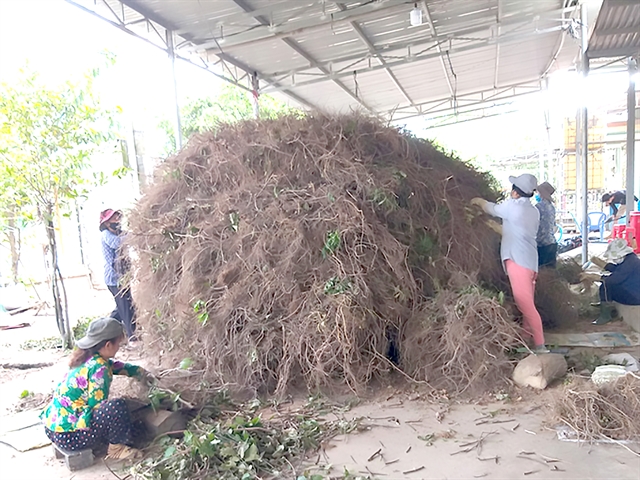 Society
Society

 |
| Farmers gather a local plant to create biological pesticides to protect their crops. — Photo nongnghiep.vn |
HÀ NỘI — Việt Nam has recently made significant strides in the production and use of biological pesticides (BP), aligning with global trends towards more sustainable agriculture.
By the end of 2023, the Plant Protection Department reported that 85 facilities nationwide were producing various forms of BP, including microbial, herbal and biochemical pesticides, the Voice of Việt Nam reports.
The country has successfully adopted several cutting-edge technologies, such as nano BP, herbal extractions and microbial-based pesticides.
These advancements highlight Việt Nam's commitment to environmentally friendly pest control solutions.
According to Nguyễn Văn Sơn, Chairman of the Việt Nam Association of Pesticide Producers and Traders (VIPA), the government has shown considerable effort to support this burgeoning sector.
Key policies have reduced the red tape associated with BP registration, cut fees and lessened the number of trials required, making it easier to bring BP products to market compared to traditional chemical pesticides.
Despite these efforts, challenges remain.
One of the major hurdles is the overly complex registration process, which is not adapted to the unique nature of biological products.
Regulations for specialised pesticides, such as pheromones, post-harvest preservatives and bait traps, are still the same as those applied to chemical pesticides, stifling innovation.
There is also no established method for determining specific concentrations of microorganisms, complicating efforts to certify, produce and import BP products.
Legal framework
For Việt Nam to fully unlock the potential of BP, the current regulatory framework needs to be modernised.
Sơn emphasised the importance of further simplifying the registration process and lowering the associated costs.
He believes that streamlining these procedures would allow BP products to enter the market more quickly, benefitting both businesses and consumers.
Dr Tony Alfonso, Chairman of CropLife Asia's Working Group on Biopesticides, suggested that Việt Nam should adopt a more flexible, case-by-case approach to BP regulation.
He proposed that human health exposure data and environmental impact assessments should only be required if a product shows a potential risk to humans or the environment. This would reduce unnecessary delays in approving safe, effective products.
A more dynamic regulatory system could help accelerate the application of new BP technologies while maintaining consistency with global standards.
For instance, genetically modified bacteria, which are being developed worldwide, offer the promise of matching chemical pesticides in efficacy while being far safer for the environment.
As such, a robust quality control system must be established to prevent low-quality, illegal products from flooding the market and undermining trust in legally registered BP solutions.
Việt Nam needs to anticipate future technological advances. Predictable legal guidelines will ensure the smooth adoption of innovative BP technologies, further improving the country's pest management capabilities.
In addition to creating a conducive legal framework, Sơn said the state must implement policies that encourage the development and production of BP. This could include tax incentives, access to loans and assistance with leasing land for research and manufacturing facilities. Investment in modern equipment for BP production and easing the importation of advanced technologies should also be prioritised.
Leveraging domestic resources could further drive BP production. For example, companies could focus on locally available materials such as indigenous microorganisms and plant-based active ingredients. By-products from agriculture could also be used to produce BP and bio-fertilisers, offering multiple benefits for the environment and crop yield.
Sơn stressed that these efforts must be backed by increased government support for research into next-generation BP products.
A national programme dedicated to promoting bio-based pesticides would build trust among farmers and further integrate these products into mainstream agricultural practices.
Investment in BP production technology, whether through direct state funding or by supporting private enterprises, will help bring down production costs, making these products more affordable for farmers. In turn, this will pave the way for the development of other promising agricultural technologies.
A skilled workforce is also essential to support this growth. Training and development in research, production and technology transfer will ensure Việt Nam remains competitive in the global BP market.
“There are three urgent tasks to boost BP production,” Sơn said.
“First, we need a dedicated legal framework to simplify registration. Second, targeted investment should develop high-potential products like antagonistic fungi and microbial-based pesticides. Third, support in capital, taxes, land and workforce training is crucial for long-term growth.”
As Việt Nam embraces more sustainable agricultural practices, the development of biological pesticides offers a promising path forward, benefitting both farmers and the environment. — VNS




